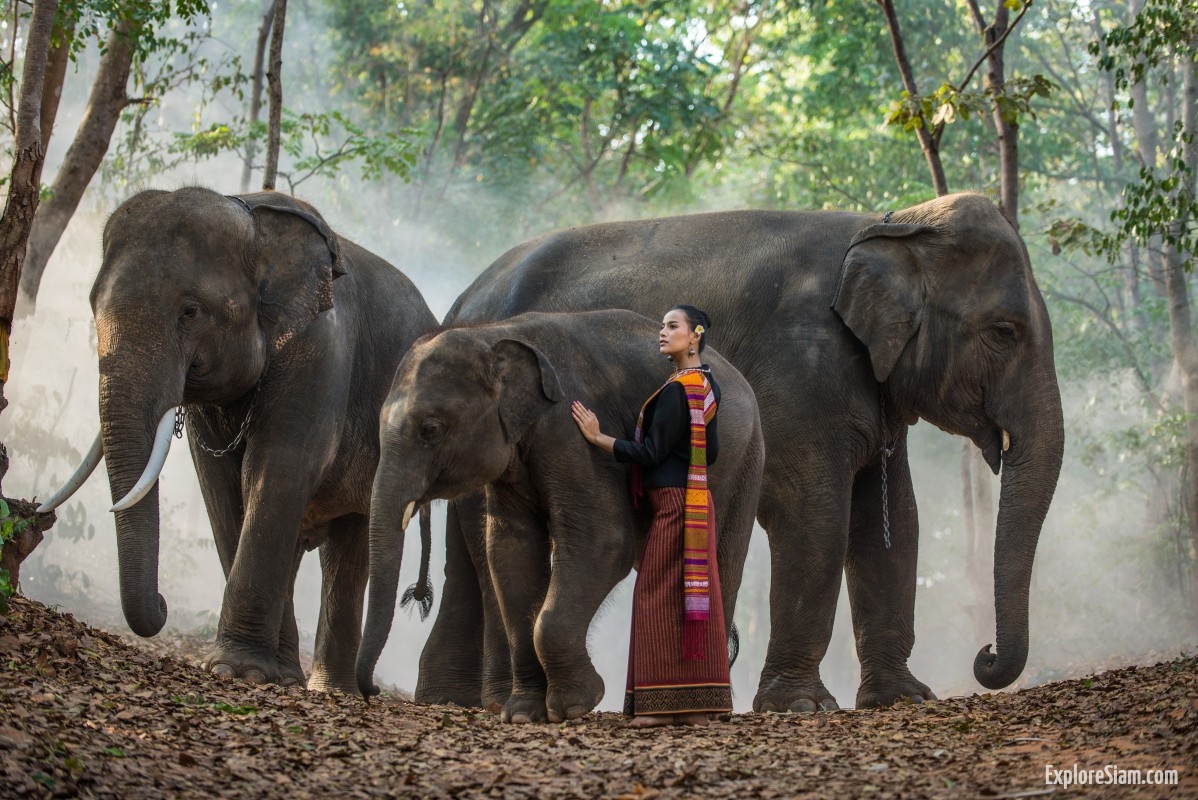Thailand, often referred to as the Land of Smiles, is a country where culture and nature are intertwined in a unique union, and the Thai elephant is a symbol of this harmony. Known as “chang” in Thai, these majestic creatures have held an important place in the hearts of the Thai people since ancient times, embodying not only strength and grace, but also deep cultural and spiritual significance.
The historical relationship between the Thai people and elephants goes back thousands of years. Elephants have been an integral part of society, from agriculture and transportation to military campaigns and ceremonies. In ancient times, they helped transport heavy teak logs through dense forests, and their ability to work in difficult conditions made them valuable assistants in the logging industry.
In the military sphere, elephants were true “fighting machines”. They participated in battles, and their fearsome appearance and power inspired fear in enemies. Historical records and murals depict elephants carrying warriors into battle. The training of war elephants was so prestigious that capturing and training these animals was considered a highly skilled art.
White elephants hold a special place in Thai culture. These rare creatures are not just white; their color is the result of a specific mutation. White elephants in Thailand are not only rare, but also sacred symbols. In ancient times, such elephants were associated with royalty and were considered symbols of purity and prosperity. Legend has it that the birth of Buddha was foretold when his mother dreamed of a white elephant offering her a lotus flower. This symbolism is deeply rooted in Thai culture, and the white elephant often features in ceremonies and temple rituals.
Elephants also play an important role in festivals and ceremonies. For example, the Surin Elephant Round-up, held in Surin Province, showcases the unique bond between elephants and their mahouts. This festival includes a colorful procession, elephant dances, and displays of their remarkable skills. It is not only a celebration of cultural heritage, but also a reminder of the importance of elephants in the lives of Thais.
Elephant souvenirs are also an important part of Thai culture and tourism. From wooden figurines and carvings to fabrics and jewelry, these items not only represent a reminder of a visit to Thailand, but also symbolism associated with elephants.
Wooden elephant figurines are often found in markets and shops throughout Thailand. These items can be made in a variety of styles, from simple carvings to intricate gemstone-encrusted ones. Each figurine has a unique design and character, reflecting the skill of Thai artisans.
Elephant fabrics are also popular. These fabrics can be used to make clothing, scarves, or even throw pillows. Elephant patterns often have symbolic meaning and can include traditional Thai motifs.
Jewelry, such as elephant earrings and rings, are an elegant way to commemorate the symbolism of Thai elephants. These items are often made of silver and gold and may be decorated with precious stones.
Additionally, elephant souvenirs often include items made from local materials such as ivory (under animal protection laws) or stone. These souvenirs can be a great way to support local arts and crafts, as well as add a piece of Thai culture to your collection.
Elephant bathing and elephant riding are popular activities among tourists who want to get up close and personal with these magnificent animals. Bathing with elephants offers a unique opportunity to interact with them in a natural and relaxing environment. Tourists can help wash the elephants in rivers and ponds using special brushes and sponges. This interaction allows not only to experience direct contact with the animals, but also to see how the elephants enjoy the water treatments.
Elephant riding also remains a popular tourist attraction. It is an experience that allows travelers to feel the majesty and power of elephants while riding on their backs along scenic routes. However, it is important to note that the practice of elephant riding has raised concerns among animal rights activists. Ethical issues such as the conditions and care of the animals have led many tour operators to move towards more humane models, minimizing stress and discomfort for the elephants.
Ethical tourism focuses on offering tourists a more conscious interaction with the animals, supporting their well-being and comfort. Sanctuaries and rescue centres such as the Elephant Nature Park in Chiang Mai offer opportunities to volunteer and participate in the care of elephants without forcing them to be used for entertainment. These initiatives help to preserve the cultural and spiritual heritage of elephants in Thailand, ensuring their protection and respect.
Modern issues are putting elephant populations at risk in Thailand. Deforestation, urbanization, and illegal logging have reduced their natural habitat. The tourism industry, while providing some benefits, has also raised concerns about the welfare of elephants used for entertainment. In response to these challenges, sanctuaries and rescue centers such as the Elephant Nature Park in Chiang Mai are being established. Founded by Sangduen “Lek” Chailert, the park is actively involved in the rehabilitation of elephants, offering them a safe haven and the opportunity to live in dignified conditions. This model of ethical tourism emphasizes the importance of humane treatment of these animals and sustainable conservation practices.
Elephants feature prominently in the art and architecture of Thailand. Wood carvings, paintings, and temple sculptures often depict elephants in various forms. The Erawan Shrine in Bangkok, dedicated to the three-headed elephant Airavata, is a prime example of the deep spiritual and cultural significance of elephants. This temple attracts many visitors seeking to pay their respects and receive blessings.
In rural communities, elephants continue to play an important role. Mahouts form lifelong bonds with them, passing on knowledge and skills from generation to generation. These close relationships are based on mutual respect and understanding, and mahouts dedicate their lives to caring for their elephant companions.
In conclusion, the Thai elephant is more than just an animal, it is a symbol of Thailand’s cultural heritage, spiritual beliefs, and historical legacy. These majestic creatures make significant contributions to the country and enrich its cultural tapestry. Despite the challenges, the bond between Thais and elephants continues to exist, supported by conservation efforts and a growing awareness of ethical standards. The future of these unique creatures remains secure, with ongoing protection efforts and humane treatment that will help to ensure that the Thai elephant remains an integral part of Thailand’s identity for many years to come.





